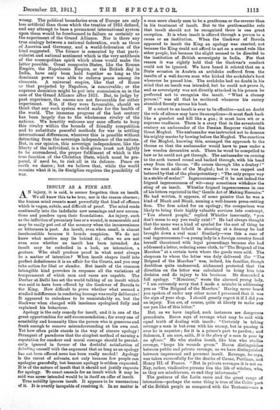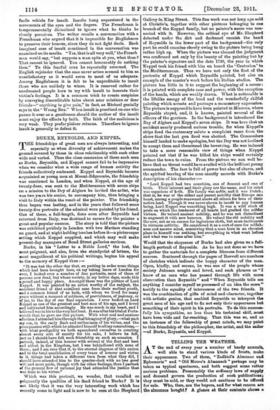INSULT AS A FINE ART.
A_N- injury, it is said, is sooner forgotten than an insult. We all know this to be true, nor is the reason obscure ; the human mind resents most powerfully that kind of offence which is vague, subtle, and difficult of proof. The mind reads continually into the indefinite new meanings and new accusa- tions and ponders upon their foundations. An injury, such as the infliction of pecuniary loss or a wound, is measurable and may be easily put out of the memory when the inconvenience or bitterness is past. An insult, even when small, is almost inexhaustible because it breeds suspicion. We do not know what motive may lie behind it ; often we are not even sure whether an insult has been intended. An insult may be embodied in a look, an intonation, a gesture. Who shall produce proof in what must always be a matter of intention? When insult shapes itself into perfect definiteness it is an affair for the Courts, and you may take action for libel or slander. But insult of the common intangible kind provokes in response all the variations of temperament of which men and races are capable. The Durbar at Delhi has set the world talking of an insult which was said to have been offered by the Gaekwar of Baroda to the King. How difficult to prove whether what seemed a studied indifference in rendering homage was really deliberate ! It appeared to onlookers to be unmistakably so, but the Gaekwar when charged with insolence apologized fully and explained his behaviour.
Apology is the only remedy for insult, and it is one of the great opportunities for self-recommendation ; for every one of sensibility and humanity likes the person who is generous and frank enough to remove misunderstanding at his own cost. Yet how often pride stands in the way of sincere apology ! Strangest of paradoxes that the simplest method of earning a reputation for candour and moral courage should be persist- ently ignored in favour of the doubtful satisfaction of deluding oneself with the argument that so long as an apology has not been offered none has been really needed ! Apology is the rarest of solvents, not only because few people can apologize gracefully, but because apology is seldom requested. It is of the nature of insult that it should not justify requests for apology. To exact amends for an insult which it may be said was never intended would be in itself an offer of insult.
True nobility ignores insult. It appears to be unconscious of it. It is overtly incapable of receiving it. In no matter is
a man more clearly seen to be a gentleman or the reverse than in his treatment of insult. But to the gentlemanlike rule that insult should not be recognized there is one great exception. It is when insult is offered through a person to a cause or an institution. When the Gaekwar of Baroda appeared to insult the King an apology was exacted, not because the King Could not afford to act on a sound rule like other people, but because the slight seemed to be directed to the institution of British sovereignty in India. For that reason it was rightly held that the Gaekwar's conduct could not be ignored. We have heard it related that on a State occasion in Austria an archduke suffered from the insults of a well-known man who kicked the archduke's boot whenever he passed him. The archduke had no doubt in his mind that an insult was intended, but he could not prove it, and as sovereignty was not directly attacked in his person he preferred not to recognize the insult. " What a clumsy person!" was all that he muttered whenever his enemy stumbled fiercely across his boot.
If a retort to an insult is ever to be effective—and no doubt the rule of silence may have its exceptions—it must flash back like a gunshot and kill like a gun ; it must have wit or a supreme readiness. There is a story that in the seventeenth centary an ambassador of the Persian Emperor visited the Great Moghul. The ambassador was instructed not to demean his mighty master by bowing before the Moghul. The courtiers of the Moghul, knowing this, arranged the approach to the throne so that the ambassador would have to pass under a low wooden decorative arch. There he woud be compelled to bow or he could not get through. The ambassador on coming to the arch turned round and backed through, with his bead away from the throne. "He comes through like a donkey !" was the neat aside of the Moghul ; but it was capped and bettered by that of the plenipotentiary : "The only proper way in a stable of mules!" Ingenuousness—if it be not indeed the feigned ingenuousness of wit—may sometimes withdraw the sting of an insult. Whistler feigned ingenuousness in one of his letters reprinted in the," Gentle Art of Making Enemies." He had written, it appears, of some painter that he was a kind of Blank and Blank, naming a well-known press-cutting firm. The firm asked for an apology ; the comparison was likely to bring their highly valuable services into contempt. "You absurd people," replied Whistler innocently, "you don't mean to say you really exist ! " He had always thought that the name was a kind of symbol for the sort of thing he bad derided, and behold in shooting at a dummy he had brought down a real man! Similarly—was this a case of real ingenuousness ?—a young lady in a foreign country found herself threatened with legal proceedings because she had addressed a letter, ordering some cloth, to " The Brigand of the Marches" at a certain town where the goods were sold. The shopman to whom the letter was duly delivered (for " The Brigand of the Marches" was, indeed, his familiar, though doubtless quite undeserved, nickname) protested that the direction on the letter was calculated to bring him into derision and do injury to his business. He demanded a full apology. "Monsieur," wrote the alarmed young lady, " I am extremely sorry that I made a mistake in addressing you as The Brigand of the Marches.' Having never heard you spoken of under any other name I presumed that it was the sign of your shop. I should greatly regret it if I did you an injury. You are, of course, quite at liberty to make any use you like of this letter."
But, as we have implied, such instances are dangerous precedents. Bacon says of revenge what may be said with equal truth of dealing with insult : " Certainly in taking revenge a man is but even with his enemy, but in passing it over he is superior ; for it is a prince's part to pardon ; and Solomon, I am sure, saith, It is the glory of a man to pass by an offence." He who studies insult, like him who studies revenge, "keeps his wounds green." Bacon distinguishes between public and private revenge, as we have distinguished between impersonal and personal insult. Revenge, he says, was taken successfully for the deaths of Caesar, Pertinax, and Henry III. of France. " But in private revenges it is not so. Nay, rather, vindicative persons live the life of witches, who, as they are mischievous, so end they infortunate."
The gestures of the Latin races and the great range of intonation—perhaps the same thing is true of the Celtic part of the British people as compared with the Teutonic—are a facile vehicle for insult. Insults hang sequestered in the movements of the eyes and the fingers. The Frenehmaai is temperamentally disinclined to ignore what he thinks he clearly perceives. The writer recalls a conversation with a Frenchman who argued that it is impossible for Englishmen to preserve their honour, since they do not fight duels. Each imagined case of insult mentioned in the conversation was examined on its merits. "Yes, that is all very well," the French man would say, " but suppose a man spits at you, what then That cannot be ignored. You cannot honourably do nothing then." To this fearful crux he repeatedly returned. The English rejoinder that the case never arises seemed to him as unsatisfactory as it would seem to most of us adequate. Among Englishmen it is felt to be unprofitable to insult those who are unlikely to wince. It is reserved rather for uneducated people here to try with insult to lacerate their victim's feelings. It is a common trick to create suspicion by conveying discreditable tales about near relations or dear friends—" anything to give pain," in fact, as Michael genially says in the " Wrong Box." When insult is practised on one who passes it over as a gentleman should the author of the insult must enjoy the effects by faith. The faith of the malicious is very weak. They prefer plainer returns. Therefore to ignore insult is generally to defeat it.



































 Previous page
Previous page